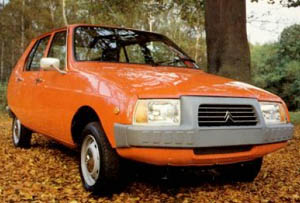|
|
| (9 intermediate revisions by 2 users not shown) |
| Line 1: |
Line 1: |
| − | [[Image:Citroen_Visa.jpg]] | + | [[Image:Citroën_Visa.jpg]] |
| | + | |
| | + | '''Citroën Visa (VD). 1978–88 (prod. n/a). 5-door saloon, 4-door convertible. F/F, 652 cm³ (I2 OHC), 1124, 1360, 1580 cm³ petrol, 1769 cm³ diesel (I4 OHC).''' The story of the Visa is possibly more interesting than the product itself: it started out as part of a joint venture with [[Fiat]] in the early ’70s, called ''Projet V''; when that partnership floundered, it inherited a GS engine to become ''Projet Y''; but when [[Peugeot]] took over the company in 1974, it was re-appraised to become ''Projet VD'', a re-clothed [[Peugeot 104]], emerging in 1978. Both four- and two-cylinder engines were offered, and the range expanded massively throughout the ’80s. Facelift arrived in 1981, which toned down the Visa’s singular styling. The C15 van survived well into the 21st century. |
| | | | |
| − | '''Citroën Axel (VD). 1978-88 (prod. unknown). 5-door saloon. F/F, 652 cm³ (2 cyl. OHC), 1124, 1360, 1580 cm³ petrol, 1760 cm³ diesel (4 cyl. OHC).''' The story of the Visa is possibly more interesting than the product itself – it started out as part of a joint venture with Fiat in the early '70s, called'' Projet V''; then when that partnership floundered, it inherited a GS engine to become ''Projet Y''; but when Peugeot took over the company in 1974, it was re-appraised to become ''Projet VD'', a re-clothed [[Peugeot 104]], emerging in 1978. Both four- and two-cylinder engines were offered, and the range expanded massively throughout the '80s. Facelift arrived in 1981, which toned down the Visa's singular styling. The C15 van survived well into the 21st century.
| |
| | | | |
| | ''Manufacturing location:'' Paris, France | | ''Manufacturing location:'' Paris, France |
| Line 7: |
Line 8: |
| | ''Marque:'' [[Citroën]] | ''Predecessor:'' [[Citroën Ami]] | ''Successor:'' [[Citroën AX]] | | ''Marque:'' [[Citroën]] | ''Predecessor:'' [[Citroën Ami]] | ''Successor:'' [[Citroën AX]] |
| | | | |
| − | q.v. [[Peugeot 104]], [[Talbot Samba]] | + | ''q.v.'' [[Peugeot 104]], [[Talbot Samba]], [[Wuling LZW 7100]], [[Oltcit (1981–94)]] |
Latest revision as of 13:18, 28 March 2020

Citroën Visa (VD). 1978–88 (prod. n/a). 5-door saloon, 4-door convertible. F/F, 652 cm³ (I2 OHC), 1124, 1360, 1580 cm³ petrol, 1769 cm³ diesel (I4 OHC). The story of the Visa is possibly more interesting than the product itself: it started out as part of a joint venture with Fiat in the early ’70s, called Projet V; when that partnership floundered, it inherited a GS engine to become Projet Y; but when Peugeot took over the company in 1974, it was re-appraised to become Projet VD, a re-clothed Peugeot 104, emerging in 1978. Both four- and two-cylinder engines were offered, and the range expanded massively throughout the ’80s. Facelift arrived in 1981, which toned down the Visa’s singular styling. The C15 van survived well into the 21st century.
Manufacturing location: Paris, France
Marque: Citroën | Predecessor: Citroën Ami | Successor: Citroën AX
q.v. Peugeot 104, Talbot Samba, Wuling LZW 7100, Oltcit (1981–94)



